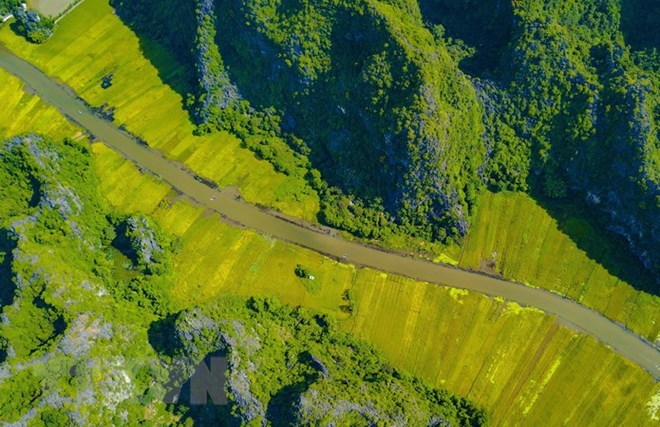



Golden ripe paddy field from Hang Mua peak (Source: VNA)
Themed "Yellow Rice Season in Tam Coc-Trang An”, the week
will be packed with various activities, such as business fairs, weaving of
traditional lace, traditional cuisine fairs, folk music and water puppetry
shows. The Tourism Week will conclude on June 16.
Located inside the Trang An Landscape Complex, which was listed as a World
Heritage Site by UNESCO on June 23, 2014, the Tam Coc-Bich Dong tourism site
has one of the most scenic rice fields in Vietnam, with a romantic waterway and
karst mountains. The site hosts various tourism forms, including eco-tourism,
spiritual tourism as well as culture and community-based tourism.
June is an impressive month at the site, with carpets of yellow rice fields
stretched along the banks of Ngo Dong river, zigzagging its way through karst
mountains and caves. Besides aesthetics and geological value, Tam Coc-Bich Dong
has a lot of cultural values too. It guards the history of the Hoa Lu ancient
imperial capital, which was chosen by various kings during the Dinh, early Le
and beginning of Ly reigns between 968-1009 as well as by primitive humans
thousands of years ago.
The Tourism Week is the first activity of its kind in the framework of a
programme celebrating the 1,050th anniversary of Dai Co Viet (Great Viet),
the first centralised feudal state in Vietnam. It also provides a platform to
showcase the province’s tourism products.
The Trang An Landscape Complex was recognised by UNESCO as the world’s mixed
cultural and natural heritage, the first of its kind in Southeast Asia.
In UNESCO's words, "Trang An is a resplendent complex of limestone karst
peaks which are permeated with valleys, including submerged ones, and
surrounded by steep, almost vertical cliffs," nestling on the southern
shore of the Red River Delta.
Archaeological traces of human activity dating back thousands of years have
been found within the complex.
The 12,250-hectare complex boasts several nationally recognised sites like the
Trang An ecotourism site and Hoa Lu, Vietnam's capital in the 10th and 11th
centuries. The area also has many temples, pagodas, paddy fields, villages and
other sacred sites.
It is home to about 500 flora species, 73 species of birds and 41 species of
other animals and has a diverse ecosystem.
Source: VNA